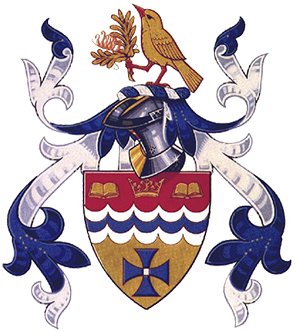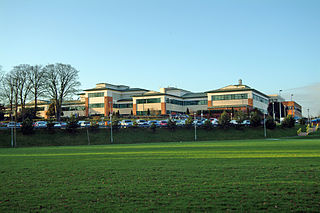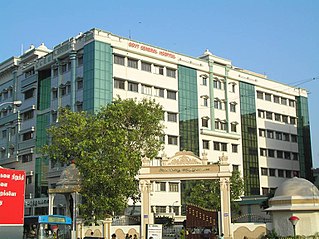
The Johns Hopkins Hospital (JHH) is the teaching hospital and biomedical research facility of Johns Hopkins School of Medicine in Baltimore, Maryland. Founded in 1889, Johns Hopkins Hospital and its school of medicine are considered to be the founding institutions of modern American medicine and the birthplace of numerous famed medical traditions, including rounds, residents, and house staff. Several medical specialties were founded at the hospital, including neurosurgery by Harvey Williams Cushing and Walter Dandy, cardiac surgery by Alfred Blalock, and child psychiatry by Leo Kanner. Johns Hopkins Children's Center which serves infants, children, teens, and young adults aged 0–21, is attached to the hospital.
The NewYork-Presbyterian Hospital is a nonprofit academic medical center in New York City affiliated with two Ivy League medical schools, Cornell University and Columbia University. The hospital comprises seven distinct campuses located in the New York metropolitan area. The hospital's two flagship medical centers are Columbia University Irving Medical Center and Weill Cornell Medical Center, situated on opposite sides of Upper Manhattan.

Dhaka Medical College and Hospital (DMCH) is a public medical college and hospital located in Dhaka, the capital city of Bangladesh. It houses a medical school as well as a tertiary care hospital on its campus.
Cambridge University Hospitals NHS Foundation Trust is a British public sector healthcare provider located in Cambridge, England. It was established on 4 November 1992 as Addenbrooke's National Health Service Trust, and authorised as an NHS foundation trust under its current name on 1 July 2004.

The Royal North Shore Hospital (RNSH) is a major public teaching hospital in Sydney, Australia, located in St Leonards. It serves as a teaching hospital for Sydney Medical School at the University of Sydney, University of Technology and Australian Catholic University and has over 600 beds.

Maimonides Medical Center is a non-profit, non-sectarian hospital located in Borough Park, in the New York City borough of Brooklyn, in the U.S. state of New York. Maimonides is both a treatment facility and academic medical center with 711 beds, and more than 70 primary care and sub-specialty programs. As of August 1, 2016, Maimonides Medical Center was an adult and pediatric trauma center, and Brooklyn's only pediatric trauma center.
Adventist Health Columbia Gorge is a hospital complex in The Dalles, Oregon, United States.

Dr. Jose Fabella Memorial Hospital, the National Maternity Hospital, is a maternal and newborn tertiary hospital located in Santa Cruz, Manila in the Philippines. It also houses the Jose Fabella Memorial Hospital School of Midwifery, one of the best performing institutions recognized by the Professional Regulation Commission in the Midwife Licensure Examinations. In 2015, the World Health Organization recognized the hospital "as a role model of the World Health Organization-Western Pacific Region Office for its essential newborn care programs, which have been proven to reduce infant morbidity and mortality".

The National Health Service (NHS) is the publicly funded healthcare system in England, and one of the four National Health Service systems in the United Kingdom. It is the second largest single-payer healthcare system in the world after the Brazilian Sistema Único de Saúde. Primarily funded by the government from general taxation, and overseen by the Department of Health and Social Care, the NHS provides healthcare to all legal English residents and residents from other regions of the UK, with most services free at the point of use for most people. The NHS also conducts research through the National Institute for Health and Care Research (NIHR).

Royal Columbian Hospital (RCH) is among the oldest hospitals in British Columbia and one of the busiest in the Fraser Health Authority. It is located in New Westminster overlooking the Fraser River and is the only hospital in the Lower Mainland that is immediately adjacent to a Skytrain station (Sapperton).

Salmaniya Medical Complex is a public hospital situated in the Salmaniya district of Manama in the Kingdom of Bahrain. Established in 1957 and having a bed capacity of approximately 1,200 beds, it is the largest tertiary hospital in the country. The hospital provides secondary, tertiary, and emergency healthcare services as well as specialised outpatient clinics for the general public. Residency programs in the hospital are either Arab Board or Saudi Board certified.

County Hospital is an acute hospital with less than 200 inpatient beds, opened in 1983. It is the main hospital in Stafford, England. The hospital is managed by University Hospitals of North Midlands NHS Trust. County Hospital's Accident and Emergency unit is the only such facility in Stafford. Wards at County Hospital are numbered, with the exception of specialist units. The hospital changed its name on 1 November 2014 from Stafford Hospital to County Hospital as part of the dissolution of the Mid Staffordshire NHS Trust.
Carteret Health Care is a 135-bed, non-profit hospital in Morehead City, North Carolina. Carteret General was founded in 1967.

Amrita Hospital, formerly known as Amrita Institute of Medical Sciences (AIMS) is a tertiary care centre based in Kochi, India attached to Amrita University school of medicine. It is one of the largest medical facilities in the country with a total built-up area of over 3.33 million sq.ft, spread over 125 acres of land. It is a 1,350-bed hospital which supports an annual patient volume of about 800,000 outpatients and 50,000 inpatients. It was inspired by Mata Amritanandamayi and inaugurated on 17 May 1998 by the then Prime Minister, Atal Bihari Vajpayee. The Mata Amritanandamayi Math is its parent organisation. The medical school is a part of the Health Sciences campus of Amrita Vishwa Vidyapeetham.

Healthcare in Chennai is provided by both government-run and private hospitals. Chennai attracts about 45 percent of health tourists from abroad arriving in the country and 30 to 40 percent of domestic health tourists. The city has been termed India's health capital. Multi- and super-specialty hospitals across the city bring in an estimated 150 international patients every day. Factors behind the tourists' inflow in the city include low costs, little to no waiting period, and facilities offered at the speciality hospitals in the city.

EMMS International is a Non-governmental Organization (NGO) that provides medical aid to countries around the world and operates offices in the UK. Founded to provide clinical education and medical aid to people in need in Scotland, it later expanded to the Middle East, South Asia, and Africa through sponsoring the construction of dispensaries and hospitals. Its education expanded from training physicians in Edinburgh to training local nurses and physicians in the countries where it works. EMMS continues to provide resource assistance at all its sites. Based in Scotland, its vision is health for today, hope for tomorrow.
Gulab Devi Chest Hospital is a 1,500 bed semi-private tertiary care chest hospital located in Ferozepur Road, Lahore, Punjab, Pakistan.The hospital was established in 1934 by Indian freedom fighter Lala Lajpat Rai in the memory of his mother, Gulab Devi, who died due to tuberculosis in 1927.

In the past, Kosovo’s capabilities to develop a modern health care system were limited. Low GDP during 1990 worsened the situation even more. However, the establishment of the Faculty of Medicine in the University of Pristina marked a significant development in health care. This was also followed by launching different health clinics which enabled better conditions for professional development.

The COVID-19 pandemic has impacted hospitals around the world. Many hospitals have scaled back or postponed non-emergency care. This has medical consequences for the people served by the hospitals, and it has financial consequences for the hospitals. Health and social systems across the globe are struggling to cope. The situation is especially challenging in humanitarian, fragile and low-income country contexts, where health and social systems are already weak. Health facilities in many places are closing or limiting services. Services to provide sexual and reproductive health care risk being sidelined, which will lead to higher maternal mortality and morbidity. The pandemic also resulted in the imposition of COVID-19 vaccine mandates in places such as California and New York for all public workers, including hospital staff.
The impact of the COVID-19 pandemic on hospitals became severe for some hospital systems of the United States in the spring of 2020, a few months after the COVID-19 pandemic began. Some had started to run out of beds, along with having shortages of nurses and doctors. By November 2020, with 13 million cases so far, hospitals throughout the country had been overwhelmed with record numbers of COVID-19 patients. Nursing students had to fill in on an emergency basis, and field hospitals were set up to handle the overflow.













